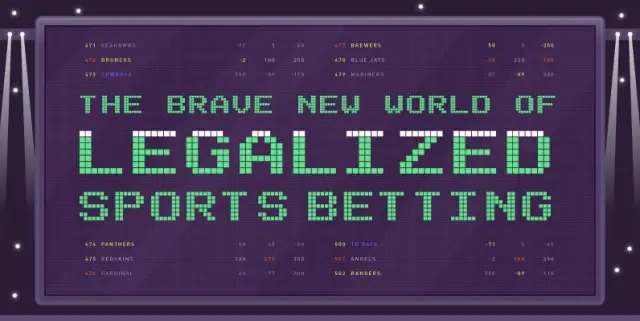For the first time in almost 26 years, sports betting fans in the US can finally relax. At the beginning of May 2018, the PASPA act was finally repealed, making sports betting once again legal. Those who enjoyed pool betting in the secrecy of their student dorms or offices no longer have to hide their hobby away.
The legalization of sports betting brings some large changes to how the sports industry will operate, and sports betting fans are not the only ones who will benefit from this new turn of events. In today’s article, we will discuss how sports betting will influence major sports leagues and their club owners, coaches, athletes, and other sports employees.
A Long Hard Road Towards Recognition
The Professional and Amateur Sports Protection Act (PASPA) was enacted in 1992. The bill is probably better known as the Bradley Act, named so after the former NBA star Bill Bradley, who was one of its greatest proponents. In its essence, PASPA was enacted to ban sports betting, as it was then deemed problem number one in the United States. The act stood to ban all sports betting in every US state except Delaware, Montana, Nevada, and Oregon.
However, throughout the years, the act was continuously challenged as unconstitutional by many legislators, including Raymond Lesniak, then senator of New Jersey. Fortunately, the act was repealed in May 2018, and it was left to each state individually to craft their own sports betting laws. The US makes for a huge market when it comes to sports, so it shouldn’t surprise anyone that many sports betting providers are now looking for their piece of the pie.
What Will Change Now?
Well for starters, a whole new market is now up for grabs to everyone who knows how to capitalize on it. Since the whole industry is still taking baby steps, we can’t really give you precise data on the economic impact, but there are already some estimates, with numbers so large your head may start to spin.
First and foremost, according to the research from NJ Games, it is expected that the whole economic output of sports betting will be somewhere around $41.2 billion. When it comes to new jobs, economists claim that the legalization will create around 90,000 new jobs in the direct industry and another 130,000 in supportive industries. This means around $11 billion in income for the new employees.
Furthermore, all that activity will benefit society as a whole, as more than $3 billion will funnel into local governments via taxes, while the federal government will receive almost $5 billion annually in tax money. In the end, the tax share will exceed even that of some countries with a long tradition of sports betting. It is expected that the total amount made from taxes will be around $6 billion, which is $1.5 billion more than the tax share the British government gets, even though sports betting has deep roots in the UK.
What About Your Favorite Leagues?
Since so much money is at stake, it’s no wonder that everyone is trying to get themselves a piece of the action. First off, players are the ones most concerned, since bets are inherently connected to their performance. Major League Baseball (MLB) players, for example, demand licensing rights for using their image.
Both the NBA and MLB have pushed for a tax called an “integrity fee.” Basically, what it means is that League directors and, especially, club owners are more than concerned that the new atmosphere may directly or indirectly influence the performance of their players. Although Leagues claim that the integrity fee is there to prevent corruption in sports, many believe that this is, in fact, a kind of bribe that’s demanded solely to ensure the support of Leagues.
The NBA and MLB have initially pushed for integrity fees as high as 1% but have since lowered their demand to 0.25%. Furthermore, the percentage mentioned is not calculated from the betting profits but from bet handles. If you take into account that the betting profits are usually four times smaller than the money handled, this leaves us with a whopping 25% of all sportsbook profits!
If that wasn’t enough, the NBA, NFL, and MLB also think that all sports data collected throughout the game should be licensed and treated as any other intellectual property.
An Unlikely Ally Appears
Sportsbook operators were rightfully infuriated with the aforementioned demands. However, they received support from the most unlikely source, and that is Sportradar, an independent third-party company that deals in measuring sports data.
Their argument is if sports betting prices are artificially inflated like that, more and more people will turn away from legal sports. This will once again mean the rise of illegal bookies and the overall decline of confidence in sports betting operators. In addition, illegal sports betting has more potential to hurt the integrity of these sports in the long run, since now there’s no one to monitor what happens behind closed doors or know who has the biggest stake in a certain game.
Leagues May Become Direct Competition
Whatever the result may be, the only thing that is for certain is the battle will be long and hard. Since PASPA is now gone, the NFL, NBA, and MLB must all battle against operators on both federal and local levels. It is just a matter of time when these almighty leagues will run out of money for their endless court cases against every single betting operator in every single state, not to mention the cases on the federal level!
One of the wisest proposed solutions is that all three leagues make their own sportsbooks. That way there wouldn’t be any further taxes and fees since leagues are already the owners of their data. Indeed, it doesn’t seem too impossible that one day you enter a stadium and have the option to place your bet right in the corridor on the way to your seat. But then again, this doesn’t solve the problem of perceived corruption, not by a long shot.






